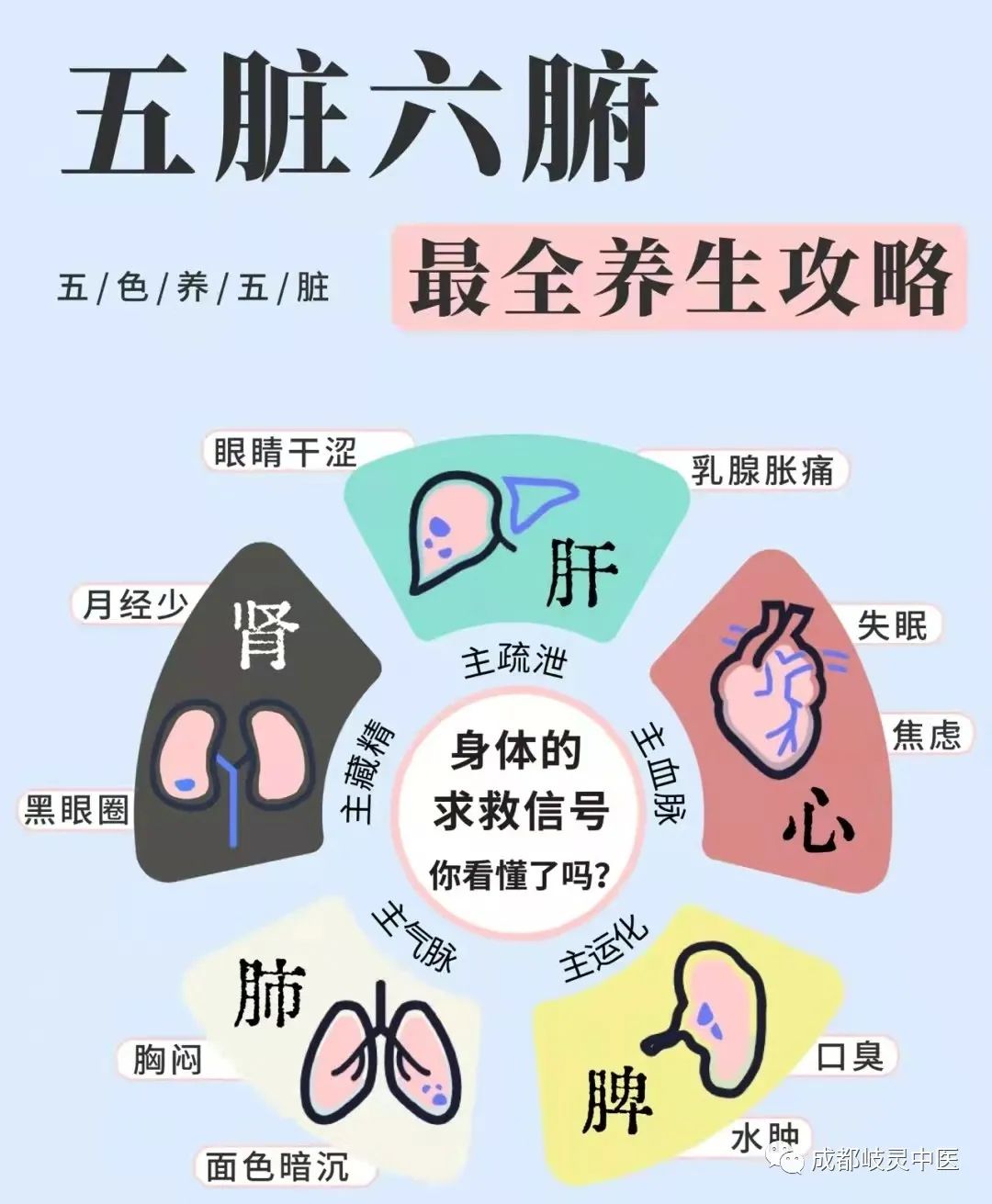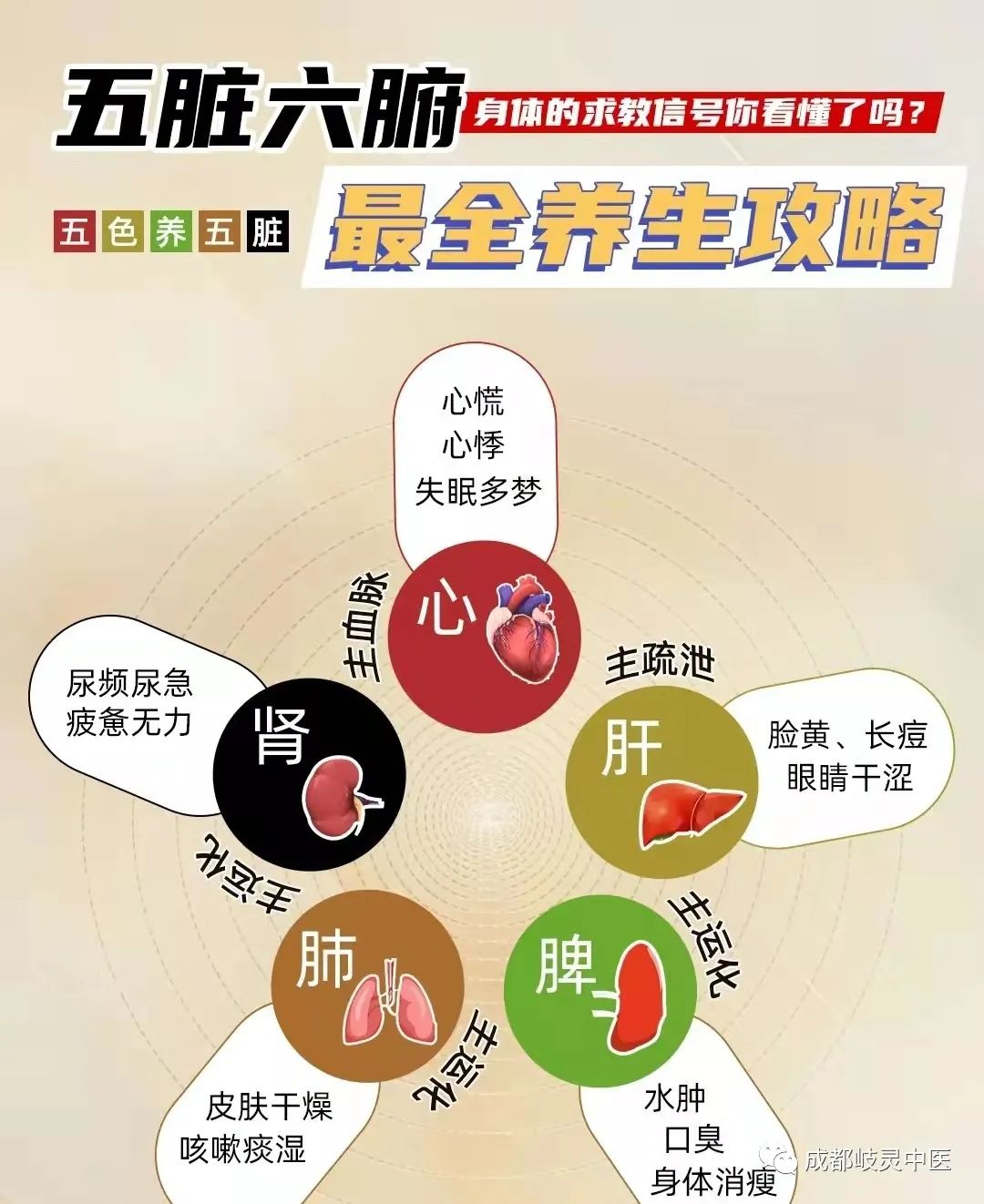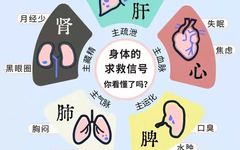The term wǔ zàng liù fǔ (五脏六腑) is familiar to most people, typically referring to the major organs of the human body. The five organs and six bowels include the shèn (kidneys), xīn (heart), fèi (lungs), pí (spleen), gān (liver), as well as the dà xiǎo cháng (large and small intestines), páng guāng (bladder), sān jiāo (triple warmer), and dǎn (gallbladder).
The five organs and six bowels constitute the major systems of the body, including the circulatory system, digestive system, and metabolic system, and are essential for maintaining normal bodily functions. As people age, issues with the five organs and six bowels become more common. So, how can we care for them?

1. Understanding the Five Organs and Six Bowels
The five organs and six bowels are undoubtedly the hardware of the human body. The organs are divided into yin and yang; the five organs belong to the interior, hence are yin; the six bowels belong to the exterior, hence are yang.
The five organs refer to the xīn (heart), fèi (lungs), pí (spleen), gān (liver), and shèn (kidneys). The five organs have the functions of generating and storing jīng qì (vital energy) and housing the shén (spirit) and will. Although their physiological functions differ, the various physiological functions of the five organs are interdependent and mutually restrictive, maintaining a coordinated balance in their physiological activities. The six bowels refer to the dǎn (gallbladder), wèi (stomach), xiǎo cháng (small intestine), dà cháng (large intestine), páng guāng (bladder), and sān jiāo (triple warmer). Their common function is to receive, digest, and excrete waste.
1. Heart
The heart is synonymous with health. Only with a healthy heart can the body perform its normal physiological functions.
Check if the heart needs care: ulcers on the tongue, acne on the forehead, insomnia, palpitations, chest tightness, or stabbing pain.
2. Liver
The liver is responsible for detoxification and participates in internal regulation. It is often said, “To nourish the skin, first nourish the liver.” A healthy liver leads to good skin. Check if the liver needs care: the fingers have raised lines or are sunken. Breast hyperplasia, noticeable breast pain before menstruation. Prone to depression. Migraines, acne on both sides of the face, and dysmenorrhea.
3. Spleen
The spleen governs blood and is the body’s immune organ. Its diseases are rare, but once issues arise, the overall health of the body will signal a red alert, as the spleen’s care cannot be neglected. Check if the spleen needs care: dark spots on the face, excessive vaginal discharge, fat accumulation, noticeable bad breath, or acne or ulcers around the lips.
4. Lungs
Among all organs, the lungs have the weakest self-protection ability and can be considered the most wronged organ. Check if the lungs need care: skin appears rusty, dull, constipation, overly sentimental, and prone to sadness.
5. Kidneys
The primary functions of the kidneys are excretion and endocrine regulation. Once kidney function is compromised, it can lead to poor drainage and toxin buildup. Check if the kidneys need care: scant menstruation, or short menstrual periods, dark color, edema, acne on the jaw, and easy fatigue.
Exercise can regulate blood circulation, and sweating helps eliminate toxins from the body.
Good sleep is closely related to the health of the five organs, as nighttime is when the five organs self-regulate.
Functions of the Five Organs
The heart governs life activities; the liver stores blood and regulates its volume; the spleen digests and absorbs nutrients and transports them throughout the body; the lungs “control respiration and govern qi”; the kidneys “store essence,” “generate marrow,” and “govern bones.”
Functions of the Six Bowels
The small intestine’s primary function is to separate the clear from the turbid after receiving food; the gallbladder secretes bile, aiding in food digestion; the stomach receives food, which is then processed by the spleen to provide nourishment to the entire body; the large intestine’s function is to conduct waste and excrete it through the anus; the bladder primarily stores and excretes urine; the triple warmer is not an independent organ but is divided into three parts based on organ location and function: the heart and lungs are the upper warmer, the spleen and stomach are the middle warmer, and the liver, kidneys, large and small intestines, and bladder are the lower warmer.

2. Focus on Seasonal Care for the Five Organs and Six Bowels
1. Spring Nourishes the Liver (Eat More Green Foods)
The liver is a very important detoxification organ in the body, and its function is particularly vigorous in spring. Therefore, special attention should be paid to liver health during this season. In terms of diet, consume more gentle qi-tonifying foods, such as garlic, scallions, and leeks, which can effectively prevent arteriosclerosis and various cardiovascular diseases.
2. Summer Nourishes the Heart (Eat More Red Foods)
Summer is hot, and people are prone to insomnia, vivid dreams, forgetfulness, and palpitations, with symptoms becoming more pronounced with age. One can take heart-nourishing pills, such as Tiānwáng Bǔxīn Wán (Tian Wang Bu Xin Wan) to nourish yin and calm the spirit, or Zhūshā Ānshén Wán (Zhu Sha An Shen Wan) to tranquilize the heart and calm the spirit.
3. Autumn Nourishes the Lungs (Eat More White Foods)
Autumn is a season when lung qi is vigorous, and some people may experience constipation. When lung qi is strong, consume more foods like pears, grapes, pomegranates, sugarcane, and lilies, which can moisten the lungs, resolve phlegm, and quench thirst, as well as alleviate constipation symptoms.
4. Winter Nourishes the Kidneys (Eat More Black Foods)
The kidneys are one of the most important organs in the body, responsible for vital metabolic functions. In cold weather, the kidneys are prone to deficiency. Those with kidney deficiency can consume more foods like yam, scallops, chestnuts, and goji berries.
3. What the Five Organs Fear
1. Avoid Anger – The First Duty of Liver Care
Traditional Chinese medicine believes that the liver enjoys smooth flow and has a function of regulation. “Anger easily harms the liver.” Anger can obstruct the flow of qi, disrupting its smooth regulation. Liver diseases often manifest as “bó jué” (薄厥), akin to a stroke, which is often related to a quick temper and easy anger.
2. Avoid Extreme Joy and Sorrow, Overwork – The Duty of Heart Care
The heart governs blood vessels, which prefer warmth and dislike cold. In summer, the abundant yang energy helps stimulate the heart and promote blood flow, while smooth blood flow further encourages the growth of yang energy in the body. Therefore, the focus of summer health care is the heart, and one should not expose it to cold.
Factors harming the heart: Information overload, climate warming can cause excessive heart fire, disturbing the spirit; noise and light pollution can lead to insomnia and vivid dreams, even premature aging; excessive reliance on air conditioning can reduce tolerance to cold and heat, disrupting the balance of yin and yang, making one more susceptible to external pathogens.
Heart care strategies: Take short naps to nourish the spirit, learn to avoid excessive information intake, reduce electromagnetic radiation, use air conditioning reasonably, eat lightly, and reduce issues like loss of appetite, bloating, and heaviness caused by summer dampness harming the spleen.
3. Avoid Poor Environment and Breathing Difficulties – The Duty of Lung Care
The lungs govern respiration, and their function is to descend smoothly, which corresponds to the autumn when yang energy declines and vitality is hidden. In autumn, the decline of temperature and the hidden yang energy help the lungs descend, promoting the storage of yang energy in the body. Therefore, the focus of autumn health care is the lungs, and one should avoid dryness and obstruction that hinder this descent.
Factors harming the lungs: Extreme heat in summer and warm winters directly affect the natural storage of yang energy in autumn and winter; unsafe air and food additives lead to impure qi, resulting in insufficient vitality; prolonged sitting at a computer with poor posture leads to shallow breathing, coupled with lack of exercise, causing relative hypoxia and waste accumulation.
Lung care strategies: Increase sleep time appropriately to replenish energy; open windows for ventilation, increase exercise, adjust breathing, and enhance lung capacity to ensure adequate oxygen intake; prevent autumn dryness by drinking more water and consuming foods like pears, lilies, and white fungus that moisten dryness.
4. Avoid Dehydration, Stress, Late Nights, and Excessive Desire – The Duty of Kidney Care
The kidneys govern storage, corresponding to the winter when all things conceal their vitality and yang energy descends. In cold weather, the kidneys benefit from the storage of energy, while the kidneys’ ability to absorb and store enhances the descent of yang energy in the body. Therefore, the focus of winter health care is the kidneys, and one should avoid restlessness that disrupts storage.
Factors harming the kidneys: Excessive pursuit of comfort, prolonged sitting on soft sofas harms the neck and lumbar spine, which also harms the kidneys, as they govern the bones; fear harms the kidneys, and excessive stress from study or work can deplete kidney essence; prolonged noise pollution and late-night activities hinder kidney storage, affecting health, intelligence, and fertility; excessive medication can be toxic to the kidneys.
Kidney care strategies: Go to bed early and rise late, exercise moderately, and avoid excessive sweating in winter that disrupts yang energy; winter tonification should be tailored to individual needs, avoiding indiscriminate tonification, and ensuring a reasonable diet while rejecting overly strong flavors.
5. Avoid Raw and Cold Foods, Irregular Diet – The Duty of Spleen Care
The spleen is the foundation of postnatal life and the source of qi and blood generation. The five organs require yang nourishment in spring and summer, and yin nourishment in autumn and winter, which necessitates the consumption of material resources. This material foundation and nutritional source come from the spleen and stomach. Therefore, “the spleen governs all seasons,” and care for the spleen and stomach should be observed throughout the year.
Factors harming the spleen: Overeating, hasty eating, and excessive consumption of rich and greasy foods. Prolonged sitting harms the flesh, excessive thinking and worry can harm the heart and spleen, and excessive treatment can damage the spleen and stomach’s ability to regulate.
Spleen care strategies: Pay attention to keeping the abdomen warm and protected from cold while nourishing the spleen and stomach.
During the day, we expend energy, and at night we restore it. Daytime is for discharging energy, while nighttime sleep is for recharging. If we only recharge 50% at night but need to release 100% during the day, we must borrow from our five organs and six bowels. Therefore, to achieve longevity, proper care of the five organs and six bowels is essential.

